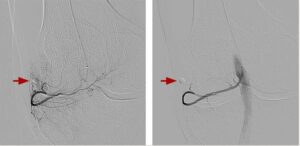Genicular artery embolization (GAE), or embolization of the knee, is a novel minimally invasive procedure that provides immediate and long-term pain relief for patients with osteoarthritis (OA) by reducing blood flow to the lining of the knee, known as the synovium. It is performed by an Interventional Radiologist (IR), a specialist physician who uses X-rays and other imaging modalities to see the body and treat diseases without surgery.
Why It’s Done?
GAE blocks the blood flow to the knee’s lining, known as the inflamed synovium. By blocking these arteries, there is a reduction in the amount of inflammation associated with osteoarthritis, a process that can help or eliminate the associated knee pain. While further research is needed, initial trials show this technique’s promise for patients with debilitating knee pain who are not ready or willing to undergo knee replacement surgery. While it may not treat the underlying cartilage destruction, the evidence shows this may be an effective way to manage the symptoms. In an article published in the Society of Interventional Radiology in March 2021, average pain scores decreased from eight out of ten before GAE to three out of ten within the first week. (click here to see full SIR article)
How is GAE Performed?
GAE is performed with moderate ‘twilight’ sedation as an outpatient procedure, meaning the patient will go home after the procedure. The procedure generally takes one to two hours. Our IR physicians will insert a small catheter (a thin hollow tube) into the artery of the patient’s upper thigh and, using X-rays, guide the catheter to the arteries supplying the lining of the knee. Tiny particles are injected through the catheter into these arteries, reducing the blood supply. This, in turn, reduces the inflammation associated with osteoarthritis, which alleviates the pain.

Are You a Candidate for GAE?
GAE is a non-surgical treatment alternative for patients with knee pain due to osteoarthritis who have failed conservative therapy, such as anti-inflammatory medications or knee injections, and who do not wish to undergo or are ineligible for knee replacement surgery.
The following conditions make for a good candidate for GAE:
- Age: 40-80 years
- Moderate to severe knee pain
- Osteoarthritis based on x-ray but without bony deformity/sclerosis
- Local knee tenderness
- Resistant/failed conservative treatment (NSAIDs/PT/joint injection)
The following conditions may disqualify a patient as a candidate for GAE:
- Current or previous history of cigarette smoking
- Advanced arthritis based on X-ray
- Infection or malignancy
- A good candidate for knee replacement surgery
If you are interested in seeing if you are a candidate for GAE, please contact us at 973-810-8100 and ask to speak to the Interventional radiology scheduling specialists to arrange an appointment with one of our IR physicians.